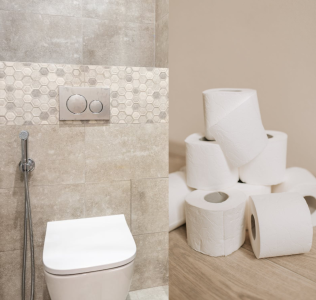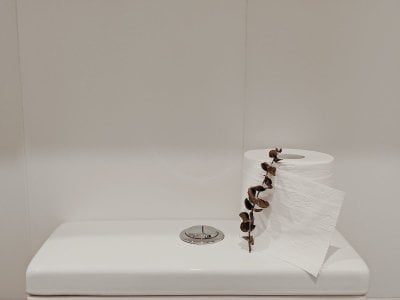Are you using toilet paper wrong? Experts reveal common mistakes that put thousands at risk of dangerous infections!
By
- Replies 6
Disclaimer: This article is not intended to be taken as medical advice, if in doubt, should seek advice from a trusted medical professional.
We all know the importance of good hygiene and how proper wiping techniques can protect us from nasty infections–but do you know the common toilet paper mistakes that could leave you at risk?
With a little bit of thought and deliberation, many of us may not be doing it quite right, and it could have consequences on our health.
Toilet paper use remains a widely debated topic—whether it should be folded, quilted, or anti-bacterial, or to use it in a wiping or patting fashion.
But according to Japanese scientists, the better option for our health is to ditch the paper altogether and use a bidet–the device where the genitals and back passage are washed with water rather than wiped.
This recommendation, backed up by a study published in the 2022 Journal of Water & Health, states that those who switched to a bidet had ten times fewer harmful bacteria on their hands than toilet paper users, leading to a dramatic reduction of the risk of nasty medical conditions.
Moreover, statistics show that C. difficile—a bacteria behind deadly diseases like diarrhoea and inflammatory bowel disease—affects over 500,000 people in the US every year. Two-thirds of these cases are linked to nursing homes, with approximately 30,000 people succumbing to its effects annually.
In response to these alarming figures, Dr Evan Goldstein, a rectal surgeon, has warned that going to the toilet by using a bidet is much better for infection control.
'All these brands have done a great job making us think that toilet paper is hygienic. It's not,' said the medic.
Still, some experts believe that it's not tissue paper itself that's the problem, but rather, the way most people use it.
Using the wrong kind of loo roll and wiping incorrectly are said to be responsible for plenty of issues–including irritation, piles, and potentially dangerous infections.
Firstly, one-ply toilet paper is thin and rough, making it more difficult to wipe correctly, leading to injuries prone to infection, like open wounds. Plus, using more pieces of one-ply paper can lead to irritation.
Moreover, bleached loo roll has been linked to a case in which a woman had irritation in her vulva (outer part of the female genitals) for four years, which made walking more difficult. When the woman travelled to Europe and used unbleached toilet paper, her symptoms improved.
Therefore, experts suggest we opt for strong, absorbent, and soft toilet tissue.
It’s also how you wipe that can really make a difference to your vaginal health. Dr Trisha Pasricha, a gastroenterologist at Massachusetts General Hospital, suggests dabbing paper around the back passage rather than wiping.
It’s especially important for women to keep to the front-to-back motion, as faecal bacteria could otherwise enter the urethra and cause a urinary tract infection (UTI).
The National Institutes of Health (NIH) confirms that this practice is one of the best methods for avoiding a UTI.
Nearly one in three women will have had at least one UTI requiring prescribed antibiotics by the time they’re 24, and almost half of all women will experience one UTI during their lifetime.
Meanwhile, men are also susceptible to urinary tract infections, though not often, according to physicians at the Urology Center of Florida.
As if that’s not enough, one study also found that not shutting the lid before you flush will spread up to 12 times more C. difficile bacteria than when the lid is down.

So, members, if there’s one takeaway from this article, it’s that when it comes to the restroom, the smallest of changes can have a major impact on your health, so be mindful, be safe, and be sure to install a bidet when you can!
What do you think of this story? Let us know in the comments below!
We all know the importance of good hygiene and how proper wiping techniques can protect us from nasty infections–but do you know the common toilet paper mistakes that could leave you at risk?
With a little bit of thought and deliberation, many of us may not be doing it quite right, and it could have consequences on our health.
Toilet paper use remains a widely debated topic—whether it should be folded, quilted, or anti-bacterial, or to use it in a wiping or patting fashion.
But according to Japanese scientists, the better option for our health is to ditch the paper altogether and use a bidet–the device where the genitals and back passage are washed with water rather than wiped.
This recommendation, backed up by a study published in the 2022 Journal of Water & Health, states that those who switched to a bidet had ten times fewer harmful bacteria on their hands than toilet paper users, leading to a dramatic reduction of the risk of nasty medical conditions.
Moreover, statistics show that C. difficile—a bacteria behind deadly diseases like diarrhoea and inflammatory bowel disease—affects over 500,000 people in the US every year. Two-thirds of these cases are linked to nursing homes, with approximately 30,000 people succumbing to its effects annually.
In response to these alarming figures, Dr Evan Goldstein, a rectal surgeon, has warned that going to the toilet by using a bidet is much better for infection control.
'All these brands have done a great job making us think that toilet paper is hygienic. It's not,' said the medic.
Still, some experts believe that it's not tissue paper itself that's the problem, but rather, the way most people use it.
Using the wrong kind of loo roll and wiping incorrectly are said to be responsible for plenty of issues–including irritation, piles, and potentially dangerous infections.
Firstly, one-ply toilet paper is thin and rough, making it more difficult to wipe correctly, leading to injuries prone to infection, like open wounds. Plus, using more pieces of one-ply paper can lead to irritation.
Moreover, bleached loo roll has been linked to a case in which a woman had irritation in her vulva (outer part of the female genitals) for four years, which made walking more difficult. When the woman travelled to Europe and used unbleached toilet paper, her symptoms improved.
Therefore, experts suggest we opt for strong, absorbent, and soft toilet tissue.
It’s also how you wipe that can really make a difference to your vaginal health. Dr Trisha Pasricha, a gastroenterologist at Massachusetts General Hospital, suggests dabbing paper around the back passage rather than wiping.
It’s especially important for women to keep to the front-to-back motion, as faecal bacteria could otherwise enter the urethra and cause a urinary tract infection (UTI).
The National Institutes of Health (NIH) confirms that this practice is one of the best methods for avoiding a UTI.
Nearly one in three women will have had at least one UTI requiring prescribed antibiotics by the time they’re 24, and almost half of all women will experience one UTI during their lifetime.
Meanwhile, men are also susceptible to urinary tract infections, though not often, according to physicians at the Urology Center of Florida.
As if that’s not enough, one study also found that not shutting the lid before you flush will spread up to 12 times more C. difficile bacteria than when the lid is down.
Key Takeaways
- Experts have warned that incorrect use of toilet paper, including the wrong type and wiping technique, can lead to infections and other health complications.
- Some scientists, such as Japanese scientists, advocate for using bidets over toilet paper as it helps reduce the risk of infections, including C. difficile.
- Dr Evan Goldstein and Dr Trisha Pasricha recommend using softer, absorbent toilet paper and dabbing instead of wiping to minimise irritation and potential infection.
- It's also emphasised that wiping front to back, particularly for women, is crucial in preventing urinary tract infections (UTIs). Closing the toilet lid before flushing is another recommended precaution to avoid spreading bacteria.
So, members, if there’s one takeaway from this article, it’s that when it comes to the restroom, the smallest of changes can have a major impact on your health, so be mindful, be safe, and be sure to install a bidet when you can!
What do you think of this story? Let us know in the comments below!










